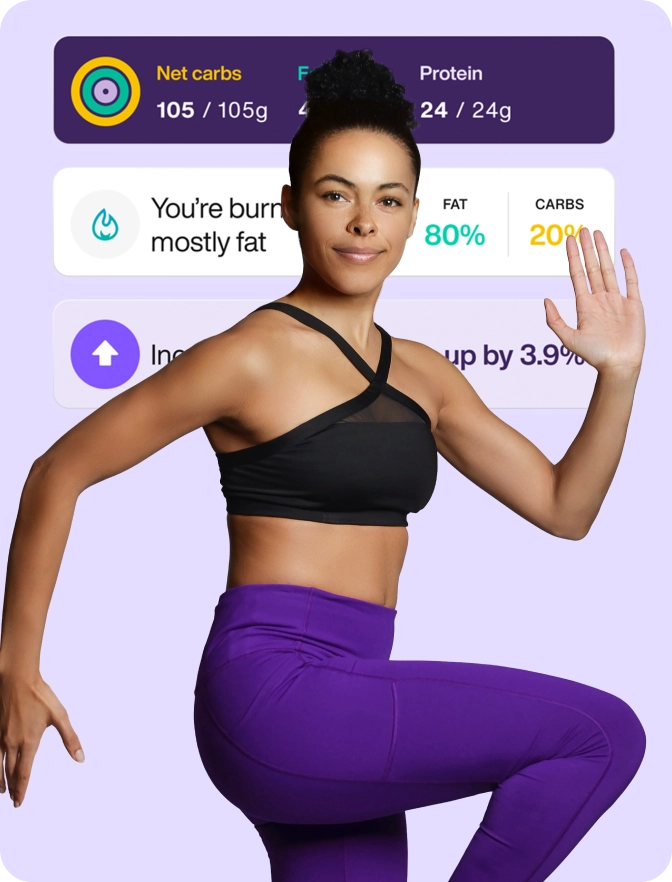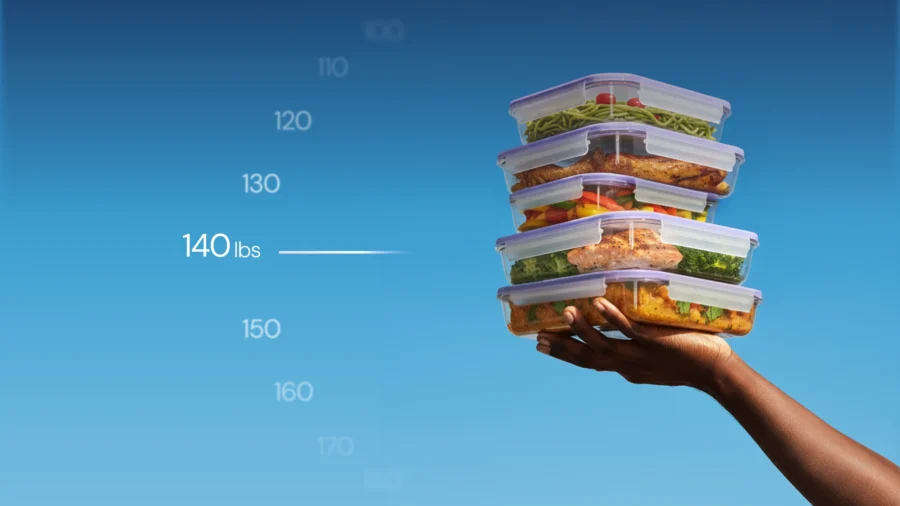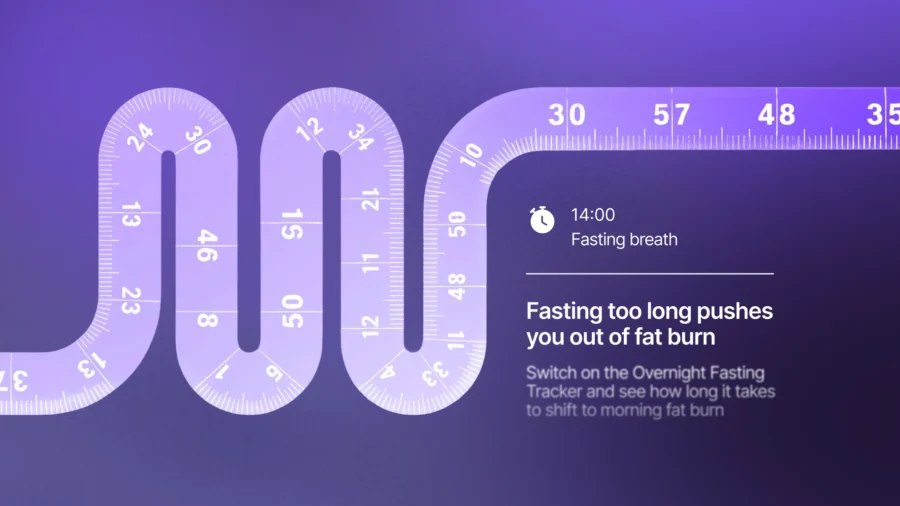There’s more to weight loss than metabolic rate and BMR

You may have heard about speeding up your metabolic rate to lose weight, but is there more to weight management than having a slow or fast metabolism?
Read on to find out.

First things first: what is metabolism?
Metabolism encompasses all the chemical processes in your body that allow for life. Your metabolism helps you convert food into energy, synthesize new compounds like protein, and eliminate waste1.
Metabolism is made up of:
Catabolism: breaking down food (e.g., carbs, fats, and protein) into simpler forms, which are then used for energy production.
Anabolism: using energy from food to build and repair the body. When we eat more than we need daily for anabolism, the body typically stores the excess as fat.
What is metabolic rate?
Your metabolism plays a crucial role in your metabolic rate (MR), or total daily energy expenditure (TDEE), which is the amount of energy you expend in a day. This energy comes from food, which the mitochondria, your cells’ powerhouses, break down.
A “slow metabolism” means your mitochondria burn fewer calories throughout the day – whether you’re resting or active. A “fast metabolism” means your mitochondria burn more calories each day.
There are two main components to your metabolic rate: basal metabolic rate (BMR) and thermogenesis2. Let’s take a closer look.
BMR
BMR is the energy your body needs to maintain essential functions, including your heartbeat, breathing, blood circulation, brain function, cell growth, and body temperature regulation. BMR typically accounts for 60-75% of your daily calorie expenditure3.
Thermogenesis
Thermic effect of food (TEF)
TEF is the amount of energy it takes your body to digest, absorb, and metabolize food.
TEF accounts for 10% of total daily energy expenditure. For example, if you eat 2000 kcals per day, approximately 200 kcals will be required to digest, absorb, and transport the nutrients in that meal.
Physical activity:
Exercise activity thermogenesis (EAT)
EAT is the energy your body uses to power workouts like walking, cycling, and weightlifting, accounting for 15-30% of TDEE.
Non-exercise activity thermogenesis (NEAT)
NEAT powers activities that aren’t exercise-based, including walking around the office, standing, climbing a few stairs, and doing chores4. NEAT accounts for 15-50% of TDEE.

Factors that affect your BMR
Age, gender, height, weight, and body composition can all impact your BMR5.
Body composition
People with more muscle mass have a higher BMR than those with less muscle mass6. That’s because muscle tissue is more metabolically active than fat tissue, requiring more energy to maintain. Even at rest, your body will burn more calories if you have a higher proportion of muscle mass.
Gender
Men generally have a higher BMR than women due to differences in muscle mass and body composition7. Additionally, hormones play a role in BMR—male hormones like testosterone can contribute to a higher BMR.
Age
BMR tends to decrease with age as muscle mass declines. In inactive individuals, BMR decreases at a rate of 1-2% every decade after the age of 208.
Hormones
Thyroid hormones play a key role in regulating BMR. People with hyperthyroidism have a higher BMR, while people with hypothyroidism have a lower BMR9.
Environment
The temperature of your environment can also affect your BMR. If you are in a cold environment, your body will expend more energy to maintain a warm temperature10.

How to calculate your BMR
Several predictive equations can be used to determine your BMR, although the Mifflin-St Jeor equation has been found to be the most reliable1112. You can use the formula below to estimate how many calories you need to maintain your weight.
For men: BMR = (10 x weight in kg) + (6.25 x height in cm) - (5 x age in years) + 5
For women: BMR = (10 x weight in kg) + (6.25 x height in cm) - (5 x age in years) - 161
How to speed up your metabolic rate
Build and maintain muscle mass
Body composition plays a significant role in determining your metabolic rate. As mentioned earlier, muscle mass requires a lot of energy to maintain compared to fat mass. The more muscle you have, the higher your BMR will be, as muscle tissue burns more calories at rest than fat tissue. This is why strength training and other muscle-building exercises are critical for anyone looking to boost their metabolism.
In one study, 10 weeks of resistance training resulted in a 7% increase in BMR13. Lumen’s metabolic coaches recommend strength training, such as weightlifting or bodyweight exercises, to increase muscle mass and improve metabolic health.

Eat more protein
Out of the three macronutrients, protein has the highest thermic effect compared to carbohydrates and fat14.
To compare:
Thermic effect of protein: 15-30%
Thermic effect of carbohydrates: 5-10%
Thermic effect of fat: 0-3%
According to research, two meals with the same amount of calories but different amounts of protein will affect metabolism differently, with the higher protein meal resulting in a higher TEF15. Consuming adequate protein at each meal can maximize your daily calorie output.
Stay physically active
You can increase your EAT by engaging in intentional exercise like running, strength training, and biking. To boost your NEAT, take the stairs instead of an escalator, stand more at work rather than sit, or walk versus take the bus.
Physical activity has the greatest variability of total daily energy expenditure and can be adapted in different ways to increase your metabolic rate.
Opt for modest calorie restriction
While you need to achieve a caloric deficit to lose weight, it is best to do so through modest caloric restriction. Due to a survival mechanism called metabolic adaptation, extreme calorie restriction will eventually cause your BMR to decrease to match the reduced calorie intake16.
Avoiding extreme calorie reduction can minimize drops in BMR and result in more sustainable weight loss.
Weight loss is about more than metabolic rate
While increasing your metabolic rate can be effective for weight management, it’s not the only factor. There’s more to weight loss than expending more energy throughout the day or having a fast metabolism. Many people restrict their calories, yo-yo diet, increase their exercise with little results, and often regain weight they lose. Hyper-focusing on metabolic rate means missing the real key to keeping metabolism in check, which is metabolic flexibility.
That’s because metabolic flexibility is the foundation of our health, including maintaining a healthy weight. Being metabolically flexible enables your mitochondria to easily switch between carb and fat burn to make abundant energy. This translates to a healthy body composition, easier weight loss and weight maintenance, balanced energy levels, and a reduced risk of metabolic syndrome.
Having this energy reserve goes beyond willpower and discipline because it helps you show up as your best self, choose the right foods to fuel your day, get to the gym, and take care of yourself and loved ones.
Your metabolic flexibility is largely influenced by lifestyle factors, which you can adjust, like nutrition, fitness, sleep quality, and stress management.
How you can improve your metabolic flexibility
Practice resistance training
Your muscles are packed with mitochondria and house most of your glycogen, your body’s glucose storage. This means the more muscle mass you gain, the more mitochondria and glycogen stores you’ll have.
As a result, your muscles can efficiently use carbs when you need an energy boost, ensuring less glucose is stored as fat. It also helps your mitochondria better metabolize fat at rest or during low-intensity activities.
Master your carb timing
Eating adequate carbs is key for metabolic flexibility, although timing is key. Eating carbs earlier in the day ensures your mitochondria don’t burn carbs overnight and can switch to fat burn. During rest, fat is the preferred fuel source for your mitochondria’s maintenance, repair, and reproduction. Moreover, eating carbs around high-intensity or prolonged exercise helps your mitochondria use them for fuel instead of storing them as fat.
Carb cycling is another great way to boost your metabolic flexibility. High-carb days allow your body to replenish glycogen stores in your muscle tissue for improved exercise performance and recovery17. Low-carb days help you tap into your glycogen reserves and fat stores for energy instead of relying on carbs for fuel. Using a metabolism tracker like Lumen can help you identify which days to eat low carb versus high carb.
Try intermittent fasting
Intermittent fasting schedules like the 18:6 plan, where you fast for 18 hours and eat within a 6-hour window, encourage your mitochondria to shift between carb and fat burn. Moving from the fed state, where your mitochondria are burning carbs, to a fasted state causes your mitochondria to switch to fat burn as your glycogen stores are depleted. While the 18:6 intermittent fasting schedule is common, finding your ideal fasting window by measuring your metabolism is essential.
Balance your macros
Anytime you eat carbs, your body releases the hormone insulin, which shuttles glucose into your cells for energy. Refined sugars, ultra-processed foods, and excessive carbs cause sharp glucose spikes and higher insulin release. Over time, this can lead to insulin resistance, which occurs when your cells don’t respond to insulin and can’t uptake glucose from your bloodstream. When your mitochondria cannot use glucose properly for energy, it gets stored as fat instead.
Lumen’s research found that obese individuals have reduced metabolic flexibility as compared to those with a healthy BMI. When measuring metabolism post-meal, the obese BMI group had a reduced metabolic shift toward carb burn, indicating they were not efficiently using up the carbs they ingested during the meal18.
To promote optimal nutrition, insulin sensitivity, and metabolic flexibility, consume all three macronutrients—carbohydrates, fats, and protein—in your meals. Opt for complex carbs like sweet potato or quinoa and pair them with healthy fats like ghee, butter, coconut oil, olive oil, or MCT oil.
Eat foods rich in CoQ10
CoQ10 is a vital compound found in every cell of your body, and one of its roles is to neutralize free radicals, which are generated as a natural byproduct of energy production within the mitochondria. However, if they aren’t neutralized, they cause oxidative stress that can damage your mitochondria. CoQ10 cleans up oxidative stress, protecting the health of your mitochondria, so they can function optimally and easily switch between using carbs and fats for fuel, depending on their availability and your body’s energy needs.
When you eat too much junk food, your body won’t have enough CoQ10 to manage all the oxidative stress created. This overwhelms your mitochondria, damages their membranes, and ultimately destroys them. The solution: good hydration and a healthy diet rich in antioxidants! You can also add a quality CoQ10 supplement to your regimen.
Manage your stress
As the stress hormone cortisol rises, it tells your mitochondria to switch to carbs to power your body quickly. This short-term spike is normal. However, constantly elevated cortisol can tax your mitochondria and cause them to become overdependent on carbs for fuel, forgetting how to burn fat.
You can manage your stress and keep your cortisol in check by:
- Taking regular walks
- Meditating
- Doing activities you enjoy
- Cutting back on caffeine
- Eating foods rich in serotonin, like salmon and nuts
- Limiting alcohol consumption
This allows your mitochondria to function optimally, using carbs and fats efficiently to keep you energized.
Metabolic flexibility is the foundation for sustainable weight loss
Supporting your metabolic health goes beyond your metabolic rate. It’s rooted in improving your metabolic flexibility. Regular monitoring with Lumen can provide valuable feedback on how different lifestyle choices affect your metabolism. This biofeedback can help you make informed changes to your diet, exercise, and other habits to optimize your metabolic flexibility and health.







 Digital download
Digital download 


